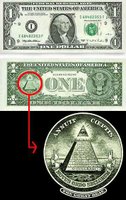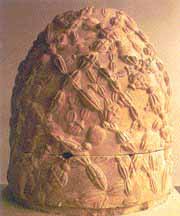L’histoire du 1 Dollar des Etats Unis d’Amérique
Ou les significations des 3 devises du sceau et du billet de 1 dollar.
Ou les significations des 3 devises du sceau et du billet de 1 dollar.
 1 - Providence Has Favored Our Undertakings
1 - Providence Has Favored Our UndertakingsThe Latin motto "Annuit Cœptis" was suggested by Charles Thomson when he put together the final design for the reverse side of the Great Seal in June 1782:
"A Pyramid unfinished. In the Zenith an Eye in a triangle surrounded with a glory proper. Over the Eye these words 'Annuit Cœptis'."
The motto has been traced to Virgil, the renowned Roman poet who lived in the first century B.C. – to a line in his Georgics, the evocative instructional manual for farmers:
"Da facilem cursum, atque audacibus annue cœptis."
Virgil's line has been translated in different ways, including:
Give me an easy course, and favor my daring undertakings.
Smooth my path, condone this enterprise of bold experiment.
Thomson changed "annue" to "annuit," the third person form of this verb that means to nod assent to, to be favorable to, to smile on.
"Cœptis" means undertakings, endeavors, beginnings.
In the motto "Annuit Cœptis," the subject must be supplied. Thomson explained:
"The pyramid signifies Strength and Duration: the Eye over it & the Motto allude to the many signal interpositions of providence in favor of the American cause."
Therefore, the subject of the sentence is Providence. "Annuit Cœptis" means "Providence has favored our undertakings" or "Providence favors our undertakings."
La Providence a favorisé nos entreprises
The official translation of "Annuit Cœptis" is:
"He (God) has favored our undertakings."
NOTE: "Annuit" does not mean "to announce" (annuntio).
"He (God) has favored our undertakings."
NOTE: "Annuit" does not mean "to announce" (annuntio).
2 - A New Order of the Ages
The Latin motto "novus ordo seclorum" was suggested by Charles Thomson when he put together the final design for the reverse side of the Great Seal in June 1782:"On the base of the pyramid the numerical letters MDCCLXXVI & underneath the following motto. 'novus ordo seclorum'"
The motto has been traced to Virgil, the renowned Roman poet who lived in the first century B.C. – to a line in his Eclogue IV, the pastoral poem that expresses the longing of the world for a new era of peace and happiness.
"Magnus ab integro seclorum nascitur ordo."
Virgil's line has been translated in different ways, including:
The great series of ages begins anew.
The ages' mighty march begins anew.
A mighty order of ages is born anew.
The majestic roll of circling centuries begins anew.
Novus means: new or young or novel.
Ordo means: row or series or order.
Seclorum (a poetic form of seculorum or saeculorum), means: of the ages or generations or centuries.
An expert in Latin, Charles Thomson coined the motto: "novus ordo seclorum" and explained:
"The date underneath [the unfinished pyramid] is that of the Declaration of Independence and the words under it signify the beginning of the new American Æra, which commences from that date."
The official translation of "novus ordo seclorum" is:
"A new order of the ages" ( Un nouvel ordre pour les siecles( seculaire))
"A new order of the ages" ( Un nouvel ordre pour les siecles( seculaire))
NOTE: "Novus ordo seclorum" does not properly translate into "new world order," which is an English phrase whose Latin translation would not be "novus ordo seclorum." Seclorum is a plural form (new worlds order?), and Thomson specifically said the motto refers to "the new American era" which began in 1776.
3 - Out of Many, One
The Latin motto "E pluribus unum" was suggested by the first Great Seal committee in 1776. It means "Out of many, one." For the final design in 1782, Charles Thomson placed this motto on a scroll carried in the beak of an American eagle.
"E pluribus unum" is a clear reference to the thirteen states united into one nation – as symbolized by the shield on the eagle's breast. Thomson said "the Motto alludes to this union."
E pluribus unum is also symbolized by the constellation of thirteen stars and the bundle of thirteen arrows.
Qui est Charles Thomson ?
THOMSON, Charles, patriot, born in Maghera, County Derry, Ireland, 29 November, 1729; died in Lower Merion, Montgomery County, Pennsylvania, 16 August, 1824.
He was brought to this country with three other brothers by his father in 1740. The father died just in sight of land, and the young Thomsons were thrown on their own resources when they landed at New Castle, Delaware An elder brother, who had emigrated before them, gave them such aid as he could, and persuaded a countryman, Dr. Francis Allison, to take Charles into his seminary in New London, Pennsylvania Here he made rapid progress, and while yet little more than a boy he was chosen to conduct a Friends' academy at New Castle.
He often visited Philadelphia, met Benjamin Franklin there, and was brought to the notice of many other eminent men. His reputation for veracity was spread even among the Indian tribes, and when the Delawares adopted him into their nation in 1756 they , called him in their tongue "man of truth." Reverend Ashbel Green, in his autobiography, says that it was common to say that a statement was "as true as if Charles Thomson's name was to it."
He was one of the first to take his stand with the colonists, and he exercised immense influence, owing to the confidence of the people in his ability and integrity. He travel led through the country ascertaining the wishes of the farmers, and trying to learn whether they would be equal to the approaching crisis. "He was the Sam Adams of Philadelphia," said John Adams, "the life of the cause of liberty." He had just come to Philadelphia in September, 1774, with his bride, a sister of Benjamin Harrison, the signer, when he learned that he had been unanimously chosen secretary of the 1st Continental congress. "He was the soul of that political body," says Abbe Robin, the chaplain of Rochambeau. He would receive no pay for his first year's services, and congress presented his wife with a silver urn, which is still preserved in the family. He remained in this post under every congress up to 1789, not only keeping the records but taking copious notes of its proceedings and of the progress of the Revolution. When he retired into private life he made these notes the basis of a history of the Revolution but he destroyed the manuscript some time before his death, as he feared that a description of the unpatriotic conduct of some of the colonists at that period would give pain to their descendants.
Mr. Thomson wrote "An Enquiry into the Causes of the Alienation of the Delaware and Shawaneese Indians, etc., with Notes by the Editor on Indian Customs" (London, 1759), and "The Holy Bible, containing the Old and New Covenant, commonly called the Old and New Testament; translated from the Greek [the Old Covenant from the Septuagint]" (4 vols., Philadelphia, 1808). This work is now very rare. It contained the first English version of the Septuagint that had been published at the time, and was considered by biblical scholars in Great Britain to have reflected high honor on American scholarship His own copy of this translation, with his last manuscript corrections, is in the Philadelphia library.
He also published "A Synopsis of the Four Evangelists, or a Regular History of the Conception, Birth, Doctrine, Miracles, Death, Resurrection, and Ascension of Jesus Christ, in the Words of the Evangelists" (Philadelphia, 1815), and left in manuscript "Critical Annotations on Gilbert Wakefield's Works," which were presented in 1832 by John F. Watson to the Massachusetts historical society.
-His relative, William Thomson, soldier, born in Pennsylvania in 1727; died in Sweet Springs, Virginia, 22 November, 1796, is said in some Irish biographies to be the brother of Charles, to have been born in Maghera, Ireland, about 1726, and about fourteen years old when he arrived in this country. He was taken to South Carolina by some friends of his family, was brought up as a frontiersman, and became famous in the district for his skill with the rifle. He fought against the Regulators in 1771, at the head of a regiment under Governor William Tryon. He was sheriff of Orange-burg in 1772, and was elected a member of the first provincial legislature, and the first state convention. He was appointed colonel in 1775 of the 3d South Carolina regiment, which was known as the Rangers. His soldiers were all skilful marksmen, and he dispersed the guerillas of General Robert Cunningham, the Tory leader.
He fought at its head at Charleston in 1776, driving the English back from the eastern side of Sullivan's island, and was formally thanked for this service by Governor John Rutledge and congress. He also served with General Robert Howe in Georgia, was engaged with his command in the attack on Savannah under Count d'Estaing and General Benjamin Lincoln, and was taken prisoner after the capture of Charleston. He served afterward under the command of General Nathanael Greene. He displayed the greatest bravery during the war, and at the end of it was broken both in health and fortunes. He was elected sheriff of Orangeburg a second time, and was a member of the State constitutional convention. Thomson was engaged in the occupation of an indigo-planter until 1786, when, seeking to benefit his declining health, he visited the mineral springs in Virginia, where he died.

1 commentaire:
Enregistrer un commentaire